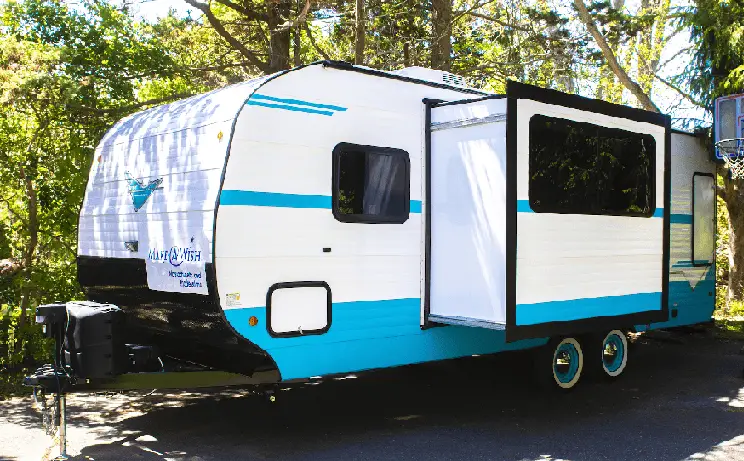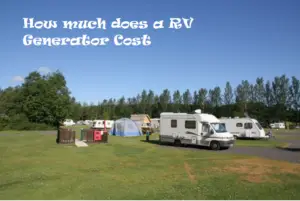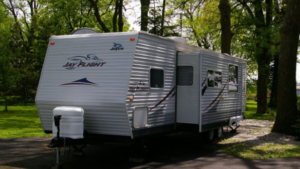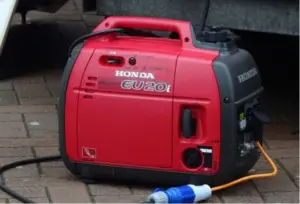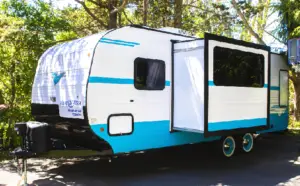If you’re an outdoor enthusiast, you’re highly likely to purchase a recreational vehicle after performing extensive research on the best brands, models, sizes, travel destinations, etc.
Since this is a huge investment, you’ll want to be sure you make the right decision that makes sense to your lifestyle. The decision to purchase a heavy-duty or lightweight travel trailer will depend on your preference and the kind of vehicle you own.
Most people tend to go for lightweight travel trailers since they can easily be towed by smaller vehicles, including vans, pickups, and sports utility vehicles.
Although investing in travel trailers can sometimes make sense, it has many other hidden issues and considerations. You’ll have to take time to find the best travel trailer based on your camping needs and learn how to tow it to get started.
There are many reasons why you should not buy a travel trailer, as explained below:
1. Low construction quality
There’s stiff competition among manufacturers of travel trailers. Even with this competition, travel trailers have high demand as more people continue purchasing them for camping and other recreational activities.
The best thing about travel trailers is that they suit all weather conditions. A recent survey of the manufacturers of these travel trailers found that they’re assembled very quickly, typically less than a day, which means that their quality can easily be compromised.
Generally, when there’s automated mass production of such huge items, there’s usually a higher risk of lowering the construction quality.
This low construction quality is also the reason behind their low prices. Most manufacturers build them for low-budget consumption.
Another survey to determine the actual manpower costs involved in assembling every single unit found that people who assemble these trailers by hand are paid per completed unit and not the normal hourly rate.
Low construction quality also means the travel trailer will be prone to many different and costly problems.
Whether you’re buying a new or used travel trailer and find out that the seller is trying to avoid certain questions, this is a warning that its quality is questionable.
2. They lose value (depreciate) much quicker
Whether you buy a new or slightly used travel trailer from even the most reputable dealers, it’ll start losing value immediately after you step on the road to travel to your favorite destination.
Research shows that travel trailers from reputable brands such as Airstream tend to hold their value for a while.
In most cases, travel trailers fail to hold their value over time due to various reasons, including their increased risk of breaking down, mainly attributed to poor maintenance, the availability of second-hand travel trailers that have already started depreciating, and lastly, the poor make of new travel trailers which in most cases are cheap.
Generally, whether you spend less or more money on acquiring a travel trailer, there’s very little difference in terms of depreciation. Statistics show that new travel trailers can depreciate by more than 40% in a period of 5 years.
This means that it’ll attract a much lower resale value if you want to get rid of it in the future. Even if you restore some features, you’ll add very little value to them.
3. Strains your towing vehicle
Towing a travel trailer requires a lot of strength, even though it has wheels. The travel trailers are made primarily of materials like steel, aluminum, or both. This means that they’re a bit heavy and can possibly strain the towing vehicle.
When the travel trailer is extremely heavy, you’ll likely experience problems with the brake pads & discs, vehicle alignment, tire treads, and general vehicle strength.
Even if you buy a travel trailer with brakes, you’ll still strain your car, especially if its weight doesn’t match that of your towing vehicle. A trailer can also destroy your vehicle’s transmission system.
This means you’ll need to service your towing car every time you use a travel trailer to improve its performance and functionality.
However, you can also incorporate various driving habits to limit straining your towing vehicle, including maintaining low speeds allowing your towing vehicle to cool down, and avoiding steep terrains or travel routes.
4. It’s challenging to set up the travel trailer alone
Setting up a travel trailer is a difficult task which is why you should avoid purchasing one, especially if you’re traveling alone.
The set up process involves many activities ranging from determining the best level spots, evaluating the trailer level, pulling back and forth, checking wheel placement, making adjustments, and checking trailer stability.
Detaching the travel trailer also requires a lot of effort to ensure no damages are done since they can be very costly. If you’re a solo traveler, you may need to find another person to help you in the set up process.
If you want to go to forest areas where it can be difficult to find people to help you set up your travel trailer, you’ll have to find another person to accompany you.
This can breach your privacy and add some extra expenses in terms of carrying extra foodstuff and other essential items for both of you. Sometimes, the other person might also want payments, especially if the trip is out of their schedule.
5. Cannot ride in a trailer
Most people will want to move in and out of the cabin when traveling to take naps, relax, and enjoy watching movies, among other activities at different times. However, this isn’t possible in a travel trailer. Therefore, if that’s what you like while traveling, purchasing a travel trailer wouldn’t be a great idea.
Most states have laws that regulate the use of RVs when traveling.
Typically, these laws recommend people always remain seated while traveling. On the other hand, they restrict passengers from riding in towed travel trailers.
This is because you have to leave the towing vehicle to climb the trailer. Most camper vans and RVs allow passengers to move freely between the cockpit and the cabin, which is beneficial, especially in places with huge rainstorms.
If you have a travel trailer, you need additional items like a raincoat and umbrella to avoid being rained whenever you want to access the trailer.
6. You need specialized driving skills
Towing a travel trailer as required isn’t something you’ll do regardless of your driving skills and experience level.
You’ll need some specialized training so that you can acquire the necessary skills to make it easier and safer to navigate through different roads and terrains without causing any problems or endangering your own life.
You must learn various aspects, including making tight turns, rest stops, changing lanes while on the road, and following the right paths when you want to refuel in a gas station.
You can train how to tow a travel trailer on a huge empty space to acquire the needed skills. You can also seek professional help if you find training alone challenging. Without proper training, you shouldn’t try towing a travel trailer since you’ll pose a danger to your life and other road users.
7. Some have limited storage capacity
When traveling for recreational activities, the last thing you’ll want to happen is to carry limited equipment due to limited storage. This is why most people consider getting huge fifth wheels and RVs since they’re spacious enough to accommodate everything you need on your camping trip.
Most travel trailers tend to have limited storage space, which can be a limitation on how much stuff you can carry. In this case, you’ll only need to focus on the essential items or equipment that you need on your trip and leave the less essential ones. This can be challenging, especially if you’re planning to travel for a few weeks.
It means that you’ll keep repeating similar activities due to the lack of a variety of recreational equipment attributed to limited storage space on your travel trailer. The only option you’re left with is to look for a large travel trailer.
Although you won’t have space limitations if you get a large trailer, you must be prepared to spend more on gas since the trailer is heavier. Additionally, more effort is required when towing a large travel trailer than a small one.
8. High maintenance costs
If you buy a travel trailer, you must be prepared to incur high maintenance costs over time to ensure it remains in good condition to continue serving you any problems. On average, you’ll spend between $500- $1,000 every year on maintenance alone.
However, these expenses can increase further based on other aspects, including accidents and frequency of use. Accidents can mainly lead to expensive repairs.
Experts recommend travel trailer owners have some contingency funds set aside to cater to such unforeseen occurrences, especially when traveling to distant destinations or campsites.
This can interfere with your monthly budget, which is why you should think twice before purchasing a travel trailer. Some maintenance tasks that will take up most of your money include tire rotation, hitch maintenance, change of brake pads, tire replacement, trailer waxing, roof sealant, window sealant, etc.
If you purchase a brand new travel trailer, you may incur lower maintenance costs at first. However, this they’ll start increasing as the trailer ages.
9. Towing a travel trailer is risky
Safety is the first thing that you need in place when traveling for your various recreational activities. Without safety, you’ll be risking your life.
Towing a travel trailer is risky compared to toy haulers and 5th wheel trailers, which use a similar coupling mechanism to those of semi-trucks. This mechanism makes towing safer by making it easier to navigate through smaller campsites where roads are a bit smaller.
If you get a travel trailer, you’ll also need to spend some money buying additional towing accessories such as aftermarket trailer brakes, sway bars, and trailer hitch for safety purposes.
The braking components are the most important accessories since they’ll help control the movements of the travel trailer. Again, it’ll be easier to minimize the risk by purchasing a small-sized travel trailer.
10. You must have adequate storage space
Most travel trailers need to be stored properly to prevent them from wearing down and extend their lifespan. Therefore, if your home has limited space, you should try as much as possible to avoid acquiring a travel trailer.
Since they’re mostly made of low-quality materials, they can easily be affected by various weather elements if not properly stored. If you lack space, you can also consider renting a storage facility which can be extremely costly.
On average, you’ll spend between $90-$200 every month on such storage facilities. These unnecessary costs will interfere with your monthly budget, which you can simply avoid.
11. Ability to compromise your gas mileage
A travel trailer can easily compromise or destroy your gas mileage. A standard trailer will reduce fuel economy by at least 7 miles per gallon. However, this will largely depend on factors like the trailer height, vehicle towing capacity, prevailing weather conditions, trailer weight, your current driving habits, and the towing terrain.
If you purchase a travel trailer, you should be prepared to spend more fuel than usual. Even if you get a class A RV model, be ready for consumption of at least 8 miles per gallon.
Even the most efficient towing vehicles will be any better for your gas mileage during towing. The only thing that can help you save fuel is to leave the travel trailer at your favorite destination or campsite and explore using your vehicle alone.
12. Possible hidden problems
This mainly happens in used or second-hand travel trailers. When buying a used travel trailer, you may not exactly know the reason why the previous owner decided to sell it.
In most cases, the reason could be major mechanical problems that are extremely costly. This means that you’re likely to start putting a lot of effort into knowing the exact problem affecting the normal functionality of the trailer.
There are high chances that you may not detect these defects without seeking professional support.
These reasons are definitely of great consideration for anyone planning to buy a travel trailer. Motorhome are great choice for hose who don’t wan tot pull the travel trailers. Campervans are also an option. In motorhomes you get 3 options class A, B and C.
Summary
In conclusion, these are some reasons you should not buy a travel trailer. Generally, a travel trailer will come with many expenses that may strain your budget.

